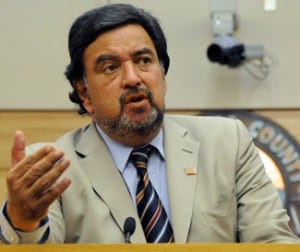
Gov. Bill Richardson (Photo by Heath Haussamen)
Wall Street Journal takes a look at the national investment scandal’s New Mexico connection
I reported in August that, though the U.S. attorney has closed one investigation into allegations of pay to play in the Richardson administration, that doesn’t mean Gov. Bill Richardson and his administration are in the clear.
That reality moved into the forefront this week when New Mexico’s former investment adviser pleaded guilty in New York to felony charges related to a kickback scheme that reaches all the way to New Mexico.
Saul Meyer admitted, according to the New York attorney general’s office, that “investments that were pushed on him by politically-connected individuals in New Mexico” and that he recommended that the state make those investments “knowing that these politically-connected individuals or their associates stood to benefit financially or politically from the investments and that the investments were not necessarily in the best economic interest of New Mexico.”
Because of that, the Wall Street Journal is taking a look today at how “Corruption allegations are again swirling around Gov. Bill Richardson’s administration.”
From the Journal:
“Political observers here said Mr. Richardson had appeared to regain a bounce to his step after being cleared in the federal bond-deal probe in late August. He hosted a delegation of North Korean officials, flew to Cuba on a trade mission and told reporters that he was running again at full steam. Political analysts began suggesting that Mr. Richardson might yet join the Obama administration, perhaps as an international envoy.
“Now, even members of the governor’s party say they sense a new swirl of scandal erupting from Mr. Meyer’s admissions.”
It’s not really a new swirl. It’s been around for months. But this scandal has been quiet in recent weeks, and Meyer’s admission has refocused attention on it.
Who was involved?
The big question: Who are the “politically connected individuals” to whom Meyer is referring? No names he gave law enforcement officials have been released publicly.
The name being brought up most often by others — even by the governor’s office — is Marc Correra, the son of a big supporter of the governor and a man who shared in $22 million in fees for helping investment companies win contracts in New Mexico.
As the state’s investment adviser, Aldus Equity’s Meyer would have been involved in recommending some of those companies that paid Correra for helping them win state investment contracts.
The governor’s office has said Richardson never had contact with Meyer, and has previously said the governor never talked to Correra about state investments. Correra’s attorney, Sam Bregman, was quoted by the Journal as saying his client “has committed absolutely no crime.”
State and federal investigations, Foy lawsuit are pending
The Journal also quoted the head of the state’s Educational Retirement Board (ERB), Bruce Malott, as saying he was “very disappointed to read that Saul Meyer recommended investments on any basis other than” their quality. He also told the Journal in an e-mail that he has “a particularly strong interest in the Justice Department conducting as thorough and prompt an investigation as possible.”
State and federal officials are probing the situation in New Mexico.
Also pending is Frank Foy’s civil lawsuit alleging a host of pay-to-play allegations at the ERB and elsewhere. Foy’s lawsuit originally alleged that the state lost $90 million in investment deals with Vanderbilt Financial made in exchange for a little more than $15,000 in contributions to Richardson’s 2008 presidential campaign, but has been expanded to make a wide range of other pay-to-play allegations involving Meyer, Correra and others.
Richardson and administration officials have vehemently denied the allegations in the Foy lawsuit.
The Richardson administration has taken strong action in response to the scandal. The governor ordered state agencies to fire Aldus earlier this year when the scandal erupted. The state also banned future use of third-party marketers like Correra and released what information it could gather from investment companies about third-party marketers they had paid to help them win state contracts in the past.
